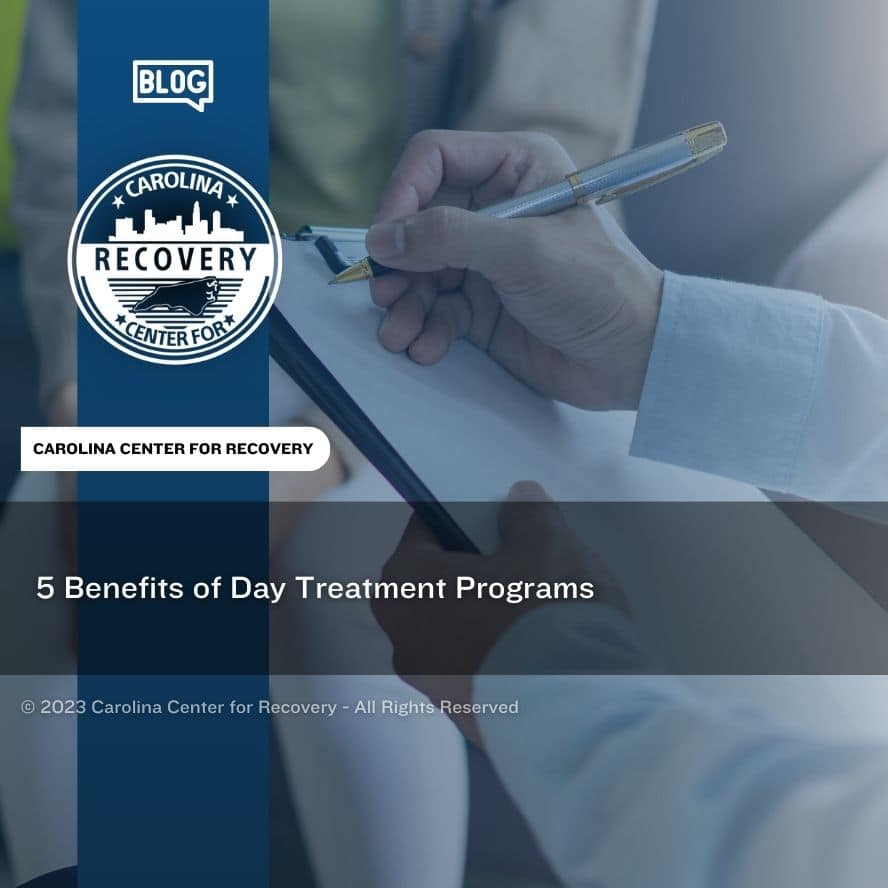5 Benefits of Day Treatment Programs

Medically Verified: 2/1/24
Medical Reviewer
Chief Editor

All of the information on this page has been reviewed and verified by a certified addiction professional.
Drug and alcohol addictions can be complex and devastating conditions that may lead to significant harm. People living with untreated addictions may face severe medical, social, legal, and financial trouble, as well as new or worsening mental health symptoms.
Because addiction is such a complex and wide-ranging condition, people require comprehensive treatment and continuing support to recover from it. Detoxification is a critical first step toward lifelong sobriety, but meaningful change requires education, therapy, group support, medications, and other therapies that support whole-person healing.
Each person has their own unique needs during treatment and recovery. Addiction treatment programs are offered in many settings and several levels of care to give each person what they need to get sober and avoid relapse. Day treatment is one level of care that provides stability, supervision, and ongoing support to people who need significant help to recover from addiction.
Learning about what happens during a day treatment program and the benefits of this type of care can help you make the best choice for your treatment needs. Reach out to the Carolina Center for Recovery specialists now to learn about our day treatment programs or to find other levels of care to meet your needs.
What is Day Treatment?
Day treatment programs are sometimes called “partial hospitalization programs (PHPs).” People in day treatment programs spend a significant amount of time each week–about 25 to 40 hours–engaging in treatment sessions and activities.
Day treatment programs are an outpatient level of care, but they provide a significant amount of support and structure for people who need intensive treatment but do not require inpatient treatment.
Day treatment programs provide structured, evidence-based treatments that include:
- Individual counseling and behavior therapy
- Family therapy, collaboration, and education
- Medications and med management
- Mental health treatment
- Medical care
- Screenings
- Relapse prevention education
- Coping skills development and practice
The intensive schedule of a day treatment program may not allow people to work or attend school as usual. However, people may stay connected to their support network and others in the community outside of treatment time.
Day treatment programs are ideal for people who:
- Have completed an inpatient or residential treatment program
- Live in an environment that increases their risk for relapse
- Need intensive supervision and treatment to manage the symptoms of addiction
- Have not been able to maintain sobriety in less-intensive outpatient treatment programs
- Have significant mental health or medical needs during addiction treatment
- Don’t feel confident that they can manage triggers or avoid relapse
A day treatment program requires commitment, dedication, and a reliable way to get to and from appointments most days during the week.
5 Benefits of Day Treatment Programs
Day treatment programs offer many benefits for people who need intensive care but want to return home after treatment sessions. Here are five of the most significant benefits of day treatment programs.
1. Lower cost than inpatient treatment
Day treatment programs provide the highest level of care in an outpatient setting. Day treatment program participants spend up to 40 hours per week engaging in therapy sessions, group counseling, education, mental health treatment, and other therapeutic activities that support recovery.
Generally, inpatient treatment is the most expensive form of addiction rehab because patients live in the treatment facility. Day treatment programs provide a substantial amount of treatment that is similar to inpatient programs but often costs less because participants continue living at home.
2. Treatment for co-occurring mental health conditions
Many people who live with drug and alcohol addiction have a co-occurring mental health condition, such as depression or anxiety. Day treatment programs offer significant care and support for people with addiction and mental illness.
Day treatment program participants follow a tailored treatment plan that addresses their specific needs. Each person’s treatment plan will include the mental health medications, therapies, and resources necessary to help them manage the symptoms of their mental illness and addiction. Treating both conditions simultaneously can lead to better outcomes and longer-lasting recovery.
3. Family involvement
Addiction affects all members of a family. Everyone in a family system must have the support and education they need to help create a healing, supportive environment for an addicted person.
Day treatment programs allow family members to be involved in family therapy sessions, education, support groups, and planning meetings. Participants and their families get to learn and work together to heal from addiction with significant support from the treatment team.
4. Community of peers
Addiction can be lonely and isolating. People in recovery may need to give up old, destructive relationships and develop new, healthy relationships that support sobriety. This can be an overwhelming task for many.
A day treatment program provides a supportive community of peers who can offer non-judgmental support and share their experiences. Day treatment participants improve communication and learn to nurture new, healthy relationships with others.
5. Remain connected to support in the community
People who participate in day treatment programs follow an intensive schedule of treatment and therapies every day and then return home in the evening. They can stay connected to friends, family members, and others in the community while receiving the care and support they need to overcome addiction.
Day treatment programs are a good option for people who do not require inpatient care but want a high level of treatment. Before beginning a treatment program, a doctor or addiction specialist will evaluate your needs and recommend the right level of care to meet them.
Learn More About the Benefits of Day Treatment
If you or a loved one lives with substance abuse or addiction, you are not alone. Reach out to the Carolina Center for Recovery team to learn about our comprehensive day treatment programs or schedule an intake assessment.

